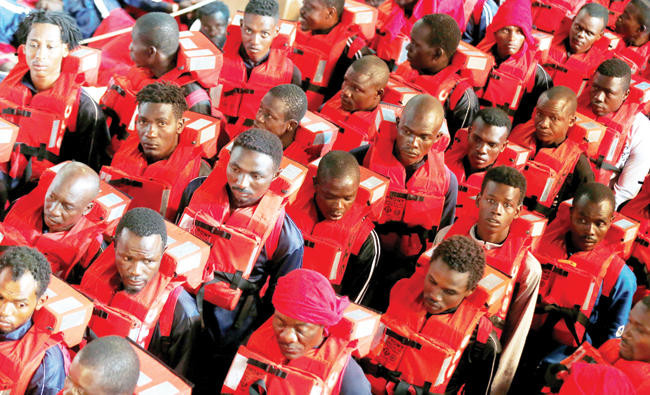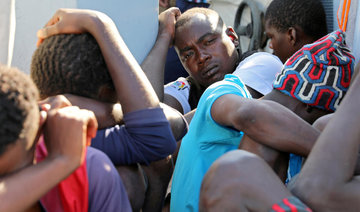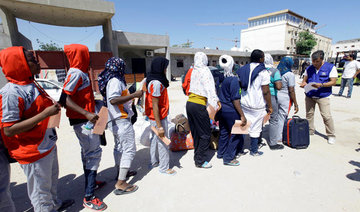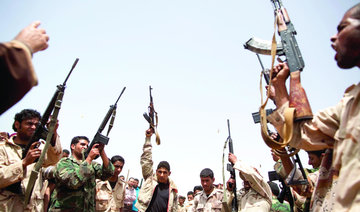ROME/TUNIS: A powerful armed group, known for smuggling people from Libya, is seeking legitimacy and state security jobs from the Tripoli government in exchange for stopping migrant boats from leaving the coast of Sabratha for Italy, a senior group member said.
The group, the Anas Al-Dabbashi brigade, struck a deal with Libya’s UN-backed Government of National Accord (GNA) this summer to clamp down on trafficking, the senior brigade member, who gave his name as Mohamed, told Reuters.
The need for the GNA to strike such a deal would illustrate the power of armed groups in western Libya, which continue to hold the real influence locally as they have since a 2011 uprising that ousted Muammar Qaddafi.
The revelation would also throw light on the fragility of the sharp recent reduction in migrant arrivals from Italy, which took over from the Aegean route as the main focus of European concerns in the crisis.
The GNA did not respond to requests for comment.
Local sources, who declined to be named, said there had been at least one meeting between government officials and Ahmed Al-Dabbashi, identified as one of the main “facilitators” of human smuggling in Libya in a UN report earlier this year.
Mohamed said there had been a number of such meetings, and that the brigade was also offered the possibility of an amnesty for past smuggling activity.
To show it could uphold the deal with Tripoli, the several-hundred-strong brigade has cracked down on departures with the help of the coast guard leading to an 80 percent fall in the arrival of rescued migrants in Italy last month, Mohamed said.
With a national election looming in the first half of next year, the government in Rome, which welcomed the sudden decline shown in official data, is under pressure to show it can stop, or at least slow, migration from the oil-producing desert state.
Libya remains split between rival political camps and armed alliances. The GNA has struggled to impose its authority on Tripoli and other parts of western Libya, and has been rejected by factions that control the east of the country.
Like normal police
Mohamed said the GNA, under pressure from Italy to halt the migrant flows, had exerted pressure on the Dabbashi brigade. The GNA “said that they would gather all the cities west of Tripoli against us, and they would come and fight us.”
“On the other hand, they have offered to let us join the police, and let us join the military,” Mohamed said. “If this plan goes forward and the (Tripoli) government was telling the truth... in six months time everybody in this battalion will be like normal police.”
A second source in Sabratha spoke to Ahmed Al-Dabbashi, who confirmed that Mohamed was a member of the brigade. It is the first time a brigade member has spoken at length about why the group suddenly shifted from smuggling to policing, a change first reported by Reuters last month.
Some international media reported that Dabbashi had received five million euros directly from Italy’s secret services to stop the migrant boats, but Mohamed denied this. Italy has also denied any direct payments to armed groups.
The fragility of the security situation in Sabratha was underscored by territorial clashes that erupted there over the weekend, with Dabbashi’s group battling cross-town rivals in some of the heaviest fighting the city has seen in recent years.
Explosions could be heard as far away as the port of Zawiya, 22 km away.
Both sides in the fighting claim to have the backing of the Tripoli government, and both battled together to drive Daesh out of the area last year.
‘Little bit smart’
With Italy and the EU offering millions of euros to local authorities in Libya who can put a cap on trafficking, armed groups have an interest in proving that they are the only ones who can police the territory.
“This smuggling thing — everybody knows that Libya is not going to be like this forever,” Mohamed said. “If you are just a little bit smart, you will go with the government.”
As a result of the policing by Dabbashi and coast guard interceptions, arrivals of rescued migrants in Italy fell 50 percent in July from a year earlier, and declined more than 80 percent in August — two months that had been peak periods during the previous three years.
Overall, there have been more than 100,000 arrivals in Italy this year, a decline of more than 20 percent compared to 2016, official Italian data show.
To rein in smuggling, Italy has spearheaded efforts to bolster the Libyan coast guard, and it is dealing directly with local governments to try to offer incentives for them to shut it down, including with Sabratha’s Mayor Hussein Al-Thwadi.
Forgiveness on table
Al-Thwadi sought support directly from Italy, meeting the ambassador earlier this month and Interior Minister Marco Minniti in July.
The Dabbashi brigade, which also guards an oil and gas facility west of Sabratha run jointly by Libya’s National Oil Corporation (NOC) and Italian firm Eni, denied any direct contacts with Italy. It is allied to Brigade 48, a group of some 300 soldiers aligned with the GNA.
“We only have deals with the (Tripoli) government,” Mohamed said. “They said they might forgive all of what we have done in the past,” he added, referring to people smuggling.
But it is unclear if Tripoli can deliver on its promises to integrate Dabbashi’s men, or whether any group can hold the line against forces who want to keep smuggling.
On Saturday, Libyan coast guard officials said they had turned back more than 1,000 migrants traveling in at least eight boats. On the same day, the Dabbashi brigade intercepted about 3,000 more, said Mohamed. More than 1,500 were rescued at sea and brought to Italy.
“A lot of people are pressuring us to stop this,” Mohamed said of Dabbashi’s crackdown on departing migrant boats. “They want to start (human trafficking) again.”
Armed group seeks legitimacy with Tripoli migrant deal
Armed group seeks legitimacy with Tripoli migrant deal

Gaza baby rescued from dead mother’s womb dies

- Doctors were able to save the baby, delivering her by Caesarean section
- The baby suffered respiratory problems and a weak immune system, said Doctor Mohammad Salama who had been caring for Sabreen Al-Rouh
RAFAH, Gaza Strip: A baby girl who was delivered from her dying mother’s womb in a Gaza hospital following an Israeli airstrike has herself died after just a few days of life, the doctor who was caring for her said on Friday.
The baby had been named Sabreen Al-Rouh. The second name means “soul” in Arabic.
Her mother, Sabreen Al-Sakani (al-Sheikh), was seriously injured when the Israeli strike hit the family home in Rafah, the southernmost city in the besieged Gaza Strip, on Saturday night.
Her husband Shukri and their three-year-old daughter Malak were killed.
Sabreen Al-Rouh, who was 30-weeks pregnant, was rushed to the Emirati hospital in Rafah. She died of her wounds, but doctors were able to save the baby, delivering her by Caesarean section.
However, the baby suffered respiratory problems and a weak immune system, said Doctor Mohammad Salama, head of the emergency neo-natal unit at Emirati Hospital, who had been caring for Sabreen Al-Rouh.
She died on Thursday and her tiny body was buried in a sandy graveyard in Rafah.
“I and other doctors tried to save her, but she died. For me personally, it was a very difficult and painful day,” he told Reuters by phone.
“She was born while her respiratory system wasn’t mature, and her immune system was very weak and that is what led to her death. She joined her family as a martyr,” Salama said.
More than 34,000 Palestinians, many of them women and children, have been killed in the six-month-old war in Gaza between Israel and Hamas militants, according to the Gaza health ministry. Israel denies deliberately targeting civilians in its campaign to eradicate Hamas.
Much of Gaza has been laid to waste by Israeli bombardments and most of the enclave’s hospitals have been badly damaged, while those still operating are short of electricity, medicine sterilization equipment and other supplies.
“(Sabreen Al-Rouh’s) grandmother urged me and the doctors to take care of her because she would be someone that would keep the memory of her mother, father and sister alive, but it was God’s will that she died,” Salama said.
Her uncle, Rami Al-Sheikh Jouda, sat by her grave on Friday lamenting the loss of the infant and the others in the family.
He said he had visited the hospital every day to check on Sabreen Al-Rouh’s health. Doctors told him she had a respiratory problem but he did not think it was bad until he got a call from the hospital telling him the baby had died.
“Rouh is gone, my brother, his wife and daughter are gone, his brother-in-law and the house that used to bring us together are gone,” he told Reuters.
“We are left with no memories of my brother, his daughter, or his wife. Everything was gone, even their pictures, their mobile phones, we couldn’t find them,” the uncle said.
UN denounces ‘more serious’ Iran crackdown on women without veils

- Hundreds of businesses including restaurants and cafes have been shut down for not enforcing the hijab rule
- More women began refusing the veil in the wake of the 2022 death in custody of 22-year-old Mahsa Amini
GENEVA: The United Nations said Friday that it was concerned by reports of new efforts to track and punish Iranian women, some as young as 15, who refuse to wear the headscarf required under the country’s Islamic law.
The UN Human Rights Office also expressed alarm about a draft bill on “Supporting the Family by Promoting the Culture of Chastity and Hijab,” which would impose tougher sentences on women appearing in public without the hijab.
“What we have seen, what we’re hearing is, in the past months, that the authorities, whether they be plainclothes police or policemen in uniform, are increasingly enforcing the hijab bill,” Jeremy Laurence, a spokesman for the office, said at a press conference.
“There have been reports of widespread arrests and harassment of women and girls — many between the ages of 15 and 17,” he said.
Iranian police announced in mid-April reinforced checks on hijab use, saying the law was increasingly being flouted.
Hundreds of businesses including restaurants and cafes have been shut down for not enforcing the hijab rule, and surveillance cameras are being used to identify women without it, Laurence said.
More women began refusing the veil in the wake of the 2022 death in custody of 22-year-old Mahsa Amini after her arrest by Iran’s morality police for allegedly breaking the headscarf law, which sparked a wave of deadly protests against the government.
Laurence said that on April 21, “the Tehran head of the Islamic Revolutionary Guard Corps announced the creation of a new body to enforce existing mandatory hijab laws, adding that guard members have been trained to do so ‘in a more serious manner’ in public spaces.”
And while the latest draft of the new hijab bill has not been released, “an earlier version stipulates that those found guilty of violating the mandatory dress code could face up to 10 years’ imprisonment, flogging, and fines,” he said, adding that “this bill must be shelved.”
The Human Rights Office also called for the release of a rapper sentenced to death for supporting nationwide protests sparked by Amini’s death.
Toomaj Salehi, 33, was arrested in October 2022 for publicly backing the uprising.
“All individuals imprisoned for exercising their freedom of opinion and expression, including artistic expression, must be released,” Laurence said.
UN seeks to deescalate Sudan tensions amid reports of possible attack

- UN Secretary-General Antonio Guterres’ envoy is engaging with all parties to deescalate tensions
UNITED NATIONS: The United Nations is increasingly concerned about escalating tensions in Al-Fashir in Sudan’s North Dafur region amid reports that the Rapid Support Forces are encircling the city, signaling a possible imminent attack, the UN’s spokesperson said on Friday.
UN Secretary-General Antonio Guterres’ envoy is engaging with all parties to deescalate tensions in the area, the spokesperson said.
Israeli army says missile fire kills civilian near Lebanon

- The violence has fueled fears of all-out conflict between Iran-backed Hezbollah and Israel
- “Overnight, terrorists fired anti-tank missiles toward the area of Har Dov in northern Israel,” the Israeli army said
JERUSALEM: The Israeli army said Friday a civilian was killed near the country’s northern border with Lebanon, as near-daily exchanges of fire with Hezbollah rage.
Both sides have stepped up attacks this week, with Hezbollah increasing rocket fire and Israel saying it had carried out “offensive action” across southern Lebanon.
The violence has fueled fears of all-out conflict between Iran-backed Hezbollah and Israel, which last went to war in 2006.
“Overnight, terrorists fired anti-tank missiles toward the area of Har Dov in northern Israel,” the Israeli army said, referring to the disputed Shebaa Farms district.
“As a result, an Israeli civilian doing infrastructure work was injured and he was later pronounced dead.”
Israeli media reported that the victim was an Arab-Israeli truck driver. Police told AFP they had not identified the body, but said it was the only one found after a truck was hit.
Hezbollah said it had destroyed two Israeli vehicles in the Kfarshuba hills overnight in a “complex ambush” on a convoy using missiles and artillery.
The Israeli army did not comment directly on the claim.
It said Israeli fighter jets struck Hezbollah targets around Shebaa village in southern Lebanon including a weapons store and a launcher, while soldiers “fired to remove a threat in the area.”
It said fighter jets also “struck Hezbollah operational infrastructure in the area of Kfarshuba and a military compound in the area of Ain El Tineh in southern Lebanon.”
Lebanon’s official National News Agency reported that Shebaa village, Kfarshuba and Helta were targeted by “more than 150 Israeli shells,” leaving homes damaged.
Iran-backed Hezbollah has been trading almost-daily fire with the Israeli army since the day after its Palestinian ally Hamas carried out an unprecedented attack on Israel on October 7.
Since October 8 at least 380 people have been killed in Lebanon, including 252 Hezbollah fighters and dozens of civilians, according to an AFP tally.
Israel says 11 soldiers and nine civilians have been killed on its side of the border.
Tens of thousands of people have been displaced on both sides.
EU commits $73 million more for Gaza aid

- New EU aid would be focused on food deliveries, clean water, sanitation and shelters
- The EU and United States have demanded that Israel allows more aid into Gaza
BRUSSELS: The European Union on Friday said it was giving an extra 68 million euros ($73 million) to provide desperately needed aid to Palestinians in Gaza.
The territory has been devastated by more than six months of Israeli bombardment and ground operations after Hamas’s October 7 attack, leaving the civilian population of two million people in need of humanitarian assistance to survive.
“In light of the continued deterioration of the severe humanitarian crisis in Gaza, and the steady rise of needs on the ground, the (European) Commission is stepping up its funding to support Palestinians affected by the ongoing war,” an EU statement said.
“This support brings total EU humanitarian assistance to 193 million euros for Palestinians in need inside Gaza and across the region in 2024.”
The EU said the new aid would be focused on food deliveries, clean water, sanitation and shelters, and would be channelled through local partners on the ground.
The United Nations has said Israel’s operation has turned Gaza into a “humanitarian hellscape,” amid fears of a looming famine.
The EU and United States have demanded that Israel allows more aid into Gaza.
The US military said on Thursday it had begun construction of a pier meant to boost deliveries to the territory.
The war in Gaza began with an unprecedented Hamas attack on Israel on October 7 that resulted in the deaths of about 1,170 people in Israel, according to an AFP tally of Israeli official figures.
Israel vowed to destroy Hamas, with a retaliatory offensive that has killed at least 34,356 people in Gaza, mostly women and children, according to the Hamas-run territory’s health ministry.






















